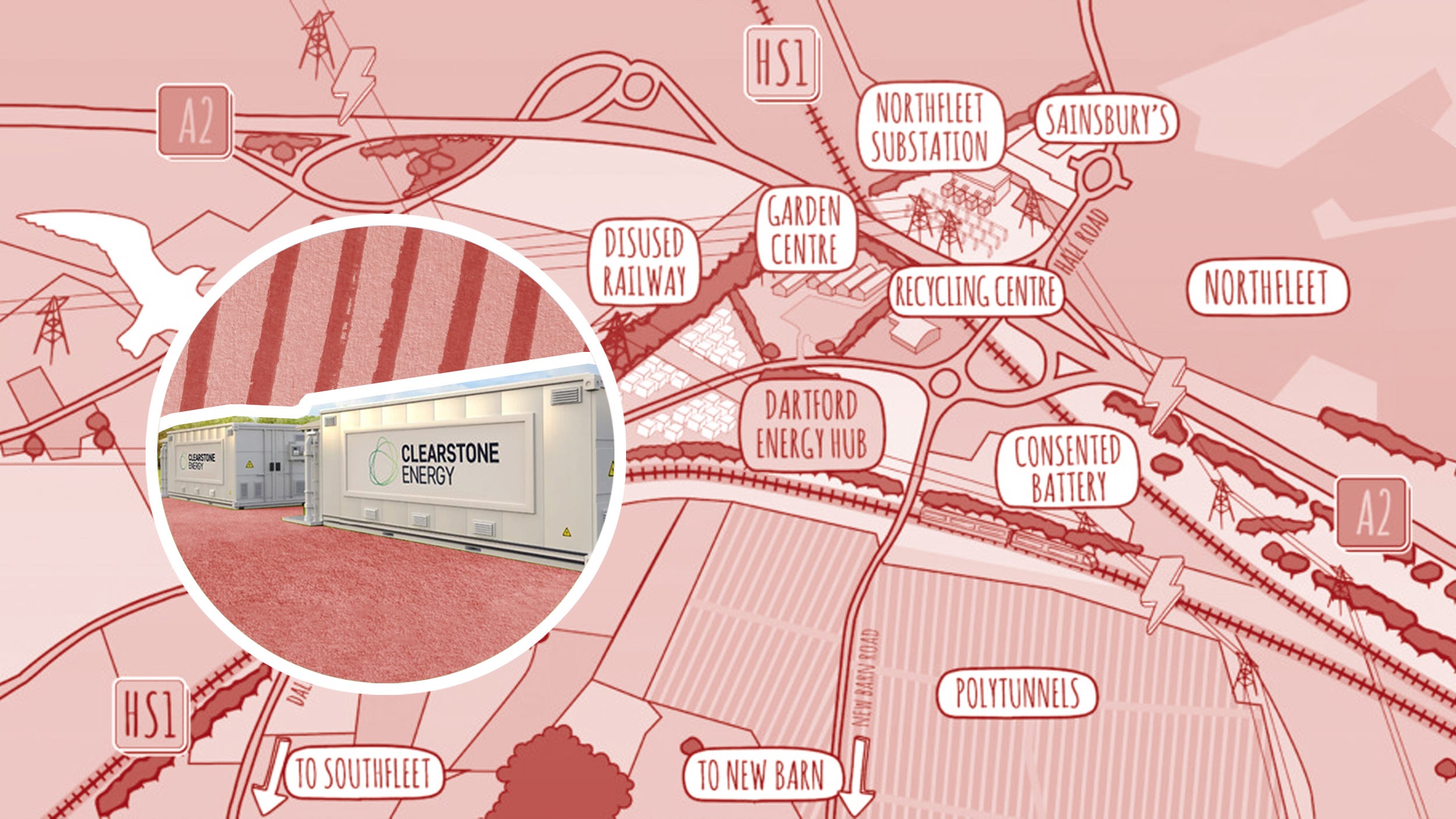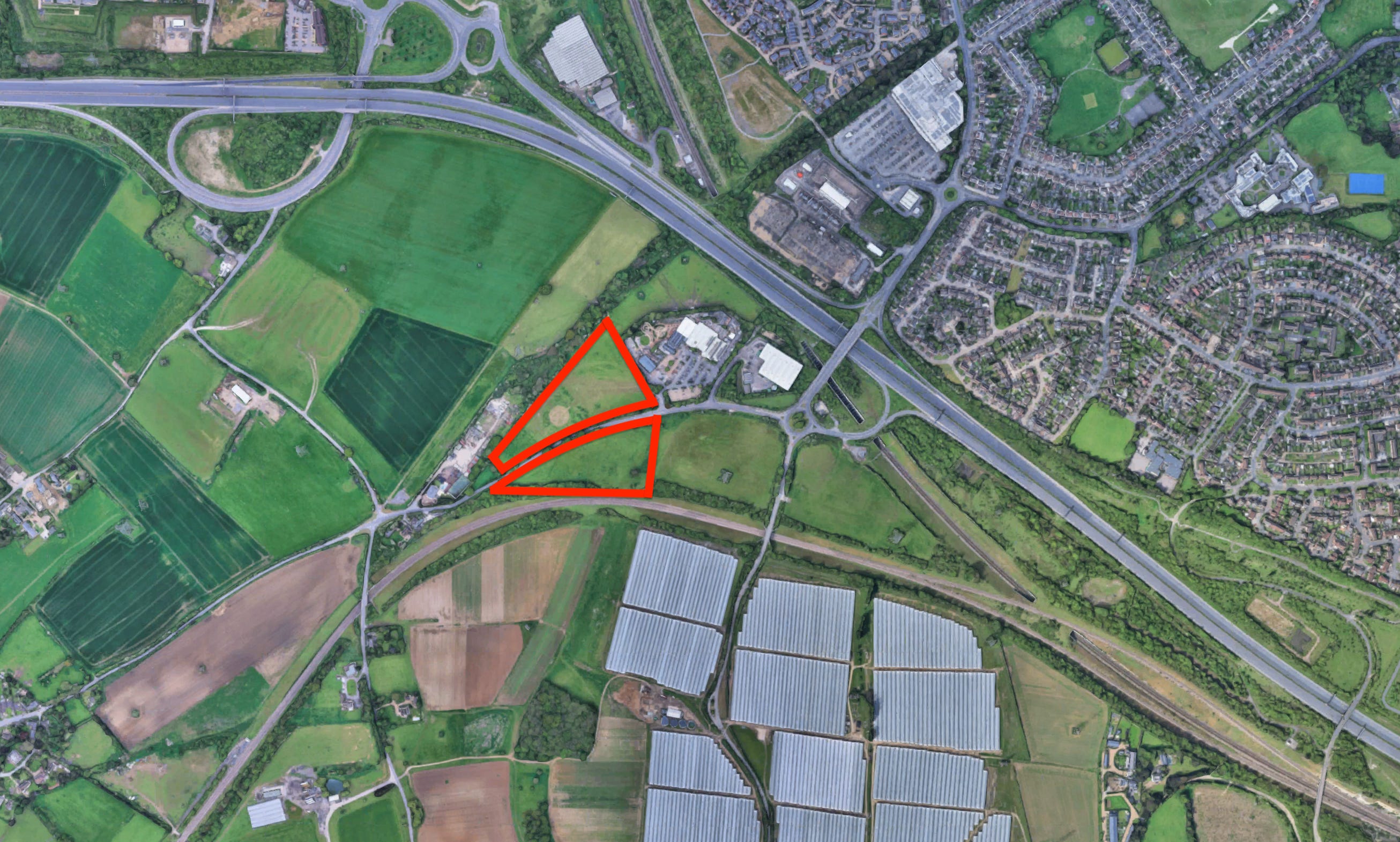Protecting imaginary countryside
Plus Reform suspends councillor in misconduct row, new hope for international rail in Ashford, news in brief, and more

Councils like to talk a good game about the transition to clean energy, but how many of them actually match that talk with action? It’s becoming common to see councils block solar farms and green energy developments, and today we have an infuriating case from Dartford. Further down, we have news of Reform losing another county councillor as part of a misconduct row, new hope for international rail services returning to Ashford, news in brief, and more.
Protecting imaginary countryside
Dartford Borough Council was expected to decide last night whether to block one of the largest battery storage projects in the UK. Not because it posed any danger or technical risk, but because planning officers believe the development in Southfleet would harm the “rural character” of land wedged between an eight-lane dual carriageway, two railway lines, a waste depot, and a garden centre car park.

The Dartford Energy Hub is a £200 million, 300MW battery site proposed by Clearstone Energy. It is designed to store excess electricity from wind and solar farms and release it back into the grid when demand rises. National Grid has already warned that without large-scale storage, the UK cannot reach net zero targets or take full advantage of renewable generation. If approved, it would be one of the largest installations of its kind. It would run without permanent staffing and produce no emissions.
The location was selected because it already sits within an infrastructure corridor, close to grid connections and away from homes. To the north sit the A2 and High Speed 1. The Pepperhill Household Waste and Recycling Centre and Millbrook Garden Centre are to the east. Pylons stride across the fields. Across Station Road are polytunnels and storage containers. Even Dartford’s officers classify the land as ‘Grey Belt,’ acknowledging it no longer performs meaningful Green Belt duties.

There are no footpaths across it. No one walks there. No one paints it. The only view is a sideways glimpse through a car window. But officers insist the project would “greatly alter and harm the rural character of the area,” objecting in particular to “unnatural, perfectly flat platforms,” as though flatness is more offensive than nearby embankments and sliproads.
What marks this case out is how little opposition came from national bodies normally keen to intervene. Historic England was content. The Environment Agency accepted the drainage plan. Kent Fire and Rescue raised no objection. Highways authorities at county and national levels were satisfied. Natural England, which routinely objects to just about everything, stood aside. Silence from them means there is nothing to protect on the site.
Public comment was minimal. 18 letters supported the scheme. 14 opposed it. Supporters noted the obvious point that if energy infrastructure cannot be placed beside a motorway and a substation, there is nowhere left for it to go. Opponents warned of industrialisation, despite being surrounded by the visible evidence of it. Officers acknowledged the land is of limited agricultural value, severed by infrastructure, and could be restored after 40 years. They noted a projected biodiversity gain of 13% through new hedgerows and woodland. But they held firm. Visual impact was the line that could not be crossed.
This is now a familiar feature of planning in Kent. Councils express support for climate action, but recoil when its physical form arrives. Solar farms are treated as intrusions. Substations are treated as threats. Words like ‘ambition’ and ‘transition’ remain welcome. The idea of clean energy is accepted, but the sight of it is not.
National planning policy requires significant weight to be given to renewable and low-carbon projects. The Dartford report does not. It elevates the theoretical appearance of a field nobody visits above the national need to store power already being produced. It treats infrastructure as alien, even in a landscape already dominated by it.
At the heart of this argument is a refusal to accept what the land has become. What is being protected is not countryside. This land will never host pastoral life. It will never be a view walked through. It is part of the service corridor of a modern county. Officers are not defending a living landscape. They are defending an empty gap.
If we can accept that energy infrastructure has to exist in visible places and that this location is as logical as any. Or councils can assert that no corner of Kent will ever be suitable, no matter how saturated with infrastructure. If they choose the latter, they will push the responsibility elsewhere and pretend the consequence stops at the boundary.
There are signs the decision may not even be allowed to play out. There are unconfirmed reports that the application was withdrawn following the officer recommendation. If true, the developer may rework its plan or walk away entirely. Withdrawal does not suggest caution but a belief that refusal is inevitable. Unfortunately, we cannot confirm this at the time of publication as Dartford Borough Council doesn’t appear to stream their meetings online, and the council’s press team didn’t respond to our questions.
This points to a deeper issue. If developers begin pulling large-scale energy projects before they reach public vote, it means local government is developing a reputation beyond negotiation. It means national infrastructure will bypass counties like Kent entirely. The grid will still expand. The question is whether Kent will host any part of it or simply import power from places willing to change.
The idea that the landscape must remain visually untouched is not sustainable. The infrastructure of the last century already occupies it. The question is whether it can now support the infrastructure of the next. Batteries cannot remain hypothetical. They must exist on land. If not here, then where?
Kent cannot continue to talk about climate ambition while refusing every site that carries consequence. Leaving a field untouched on a map will not lower emissions. Preserving an image will not keep the power on. The view from Station Road may remain exactly the same. The cost of keeping it will appear somewhere else.
Reform suspends councillor in misconduct row
Reform has suspended Kent county councillor Robert Ford, who represents Maidstone Rural West, following allegations of misconduct made by multiple women. Ford, who was elected in May as part of Reform’s sweeping of 57 seats, will now sit as an independent while an internal investigation takes place. His removal marks the third loss for the party in Kent since the local elections, deepening scrutiny over how a group that entered County Hall promising discipline and disruption is increasingly becoming defined by internal upheaval.

The circumstances around Ford’s suspension are already disputed. Reform briefed that it had received an informal complaint from several women, reportedly concerning inappropriate or lewd remarks, and that Ford was offered a meeting with the whips’ office to respond. According to the party, he declined to engage with that process, leaving them “no choice” but to suspend him.
Ford contests that account entirely. In comments to both the BBC and ITV, he said he only became aware of the allegations “a few hours” before his suspension was made public, claiming he heard of them via a third party and had not been given any details. He has denied wrongdoing and suggested he will consider legal action against those making the complaints.
Ford had been appointed to the Kent & Medway Fire & Rescue Authority committee, but otherwise, he hadn’t made a big impression on the council. His X account is oddly light on content but features a lot of photographs he’s taken at council meetings.
This is the latest in a run of controversies for Reform in Kent. Earlier this year, Cliftonville councillor Daniel Taylor was suspended and now awaits trial over allegations including threats to kill his wife. Another Reform councillor resigned the whip and defected to UKIP. Less than five months into their first term holding significant power on the council, the party’s momentum is being overshadowed by internal crises, disciplinary disputes and departures.
Reform entered rural and suburban Kent with the promise of straight talking and accountability, positioning itself as an alternative to what it portrayed as complacent establishment politics. Instead, it has spent much of its short tenure responding (or not responding) to misconduct allegations involving its own councillors. Ford’s case, with its conflicting accounts and threatened legal escalation, leaves the party facing another prolonged and public test of credibility, one that it cannot easily blame on opponents. Whether the investigation concludes quietly or expands into something more serious, the question lingering over Reform in Kent is no longer how it governs others, but how it governs itself.
Kent edges closer to a return of cross-channel services
For the first time since Eurostar abandoned Kent, there is a credible plan on the table to bring international rail services back, and it isn’t coming from the company that left. Italy’s state rail operator, Ferrovie dello Stato (FS), has confirmed it is preparing a bid to run services through the Channel Tunnel, with Ashford International proposed as its first UK hub. It is talking about investment of up to £1bn, Paris connections by 2029, and a specific commitment to stop in Kent.
This matters because it moves the conversation on from protest to possibility. Until now, Kent has been making a case. Now someone with trains, capital and intent is making one too.
Only a month ago, we watched the old Eurostar lounge at Ashford briefly come back to life with a ribbon, a performance, a minister assuring the room that “the government hears you,” before it fell silent again. That event felt symbolic. FS’s arrival makes it strategic. If Eurostar won’t return, others are now willing to try.
There are still serious obstacles. No operator can run from Kent without access to the Temple Mills depot in London, currently controlled by Eurostar. The rail regulator, the ORR, has hinted that capacity could be opened. Eurostar insists it is already full. That decision will determine whether this new competition becomes real or remains theoretical. But unlike previous expressions of interest, FS is not speaking in hypotheticals. It already runs cross-border services in Europe. It already has rolling stock in development. It already operates at scale.
The economic argument behind Kent’s campaign is also clearer than ever. Before the pandemic, only 4% of Eurostar passengers boarded at Ashford or Ebbsfleet. Local leaders believe those numbers reflected retreat, not demand. Business groups have run out of patience, and tourism bodies talk of falling European visitors. Political voices on both sides of the channel want the services to return.
Other competitors are now queueing up. Virgin has submitted its own bid for Tunnel access. Gemini Trains plans services that would call at Ebbsfleet en route to Brussels and Cologne. All of them name Kent. None of them repeats Eurostar’s argument that stopping here is not viable.
No one is promising an immediate return. FS acknowledges that services would take years to build. But this is the first time since trains stopped that a major operator has publicly committed to Kent. It shifts the question from if back to when, and from pleading to planning.
What happens next will be decided in boardrooms and regulator briefings, but Kent is back on the departure board for the first time in years.
In brief
🚓 Kent Police has apologised and paid damages to a woman who was threatened with arrest under the Terrorism Act for holding a Palestinian flag at a protest in Canterbury.
📣 An Oxford student from Tunbridge Wells has been arrested after leading a chant of ‘put the Zios in the ground’ at a pro-Palestinian rally in London.
🏥 In another sign that everything is going well at the William Harvey Hospital in Ashford, the café again had to be screened off to give privacy to patients being treated in corridors.
🚗 Delays at the Dartford Crossing have increased in the month since the toll to cross was increased by £1.
🏚️ The Regulator of Social Housing has found ‘serious failings’ with the safety and quality of housing stock at Canterbury City Council.
🗳️ Sevenoaks District Council held an Extraordinary Council meeting this evening to pass a motion of no confidence in council leader Roddy Hogarth. The move is the latest twist in a turbulent time at the council, sparked by nine Conservatives who broke away from the ruling party to form the West Kent Independents. Cllr Hogarth previously said he would be willing to stand down if the splinter group returned to the fold.
More Currents
For our midweek column, former MEP and Development Manager for the Federation of Small Businesses in Kent, Tim Aker, writes on the political changes sweeping our county and country, and their likely impact.

Footnotes
Have a Kent story you think we might be interested in? Get in touch via hello(at)kentcurrent(dot)news - We’re always happy to talk off the record in the first instance…
Follow us on social media! We’re on Facebook, BlueSky, and Instagram for now.
Enjoying the Kent Current? Pass it on. If you know someone who’d like this too, forward them this email and invite them to subscribe.





